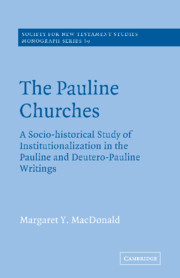 The Pauline Churches
The Pauline Churches Published online by Cambridge University Press: 10 December 2009
The following study investigates the social setting of the Pastoral Epistles. On the one hand, it considers the influence of the structures of Greco-Roman society on the life of the church; on the other hand, it focuses on the community's relations with the outside world. The social tensions related to a strong desire to evangelize are studied. The implications of the ethos of love-patriarchalism for the community's dealings with the outside world are considered. The attitudes to women and wealth visible in the text are investigated in order to clarify the significance of this ethos for community life.
Studying contacts with the Greco-Roman world: problems of methodology
It is somewhat ironic that commentators consistently point to influences from Greco-Roman society evident in the Pastorals but only rarely speak of the implications of such influences for the life of the community behind these writings. Parallels are drawn with current philosophical thought. However, because connections are made on a purely literary level, almost nothing is revealed about their significance for understanding the situation underlying the Pastorals. Furthermore, among scholars believing 1 Timothy, 2 Timothy, and Titus to be deutero-Pauline, there is a tendency to describe external influences as penetrating the Pauline world as quickly as a quotation from a contemporary philosopher might be mechanically inserted into a given text. This is not to suggest that influences from the Greco-Roman world are not more prevalent in the Pastoral Epistles than in other Pauline writings.
To save this book to your Kindle, first ensure [email protected] is added to your Approved Personal Document E-mail List under your Personal Document Settings on the Manage Your Content and Devices page of your Amazon account. Then enter the ‘name’ part of your Kindle email address below. Find out more about saving to your Kindle.
Note you can select to save to either the @free.kindle.com or @kindle.com variations. ‘@free.kindle.com’ emails are free but can only be saved to your device when it is connected to wi-fi. ‘@kindle.com’ emails can be delivered even when you are not connected to wi-fi, but note that service fees apply.
Find out more about the Kindle Personal Document Service.
To save content items to your account, please confirm that you agree to abide by our usage policies. If this is the first time you use this feature, you will be asked to authorise Cambridge Core to connect with your account. Find out more about saving content to Dropbox.
To save content items to your account, please confirm that you agree to abide by our usage policies. If this is the first time you use this feature, you will be asked to authorise Cambridge Core to connect with your account. Find out more about saving content to Google Drive.